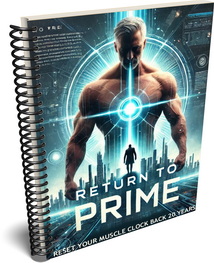How to Use a Low-Calorie Diet to Build Muscle
This is going to sound strange but when you're trying to build muscle, I HIGHLY recommend doing a strategic low-calorie diet on a regular basis.
Why low-calorie dieting for MUSCLE?

There are several reasons...
1. Appetite
First, I've found that eating large amounts of food for long stretches of time tends to diminish your enthusiasm for eating large amounts of food for long stretches of time.
When your appetite drops, you're not going to be able to eat as much without forcing yourself to, and therefore, your overall calorie intake can potentially be diminished. I can tell you from experience, if you eat a LOT all the time, you do get tired of eating. This is a way to fix it and hit the "reset" button on your appetite, which is going to pay off when you go back to eating more again.
2. Digestive System Overload
The digestive system can be overworked if you demand too much of it with no break. By constantly hammering the digestive tract with piles of food, you're basically grinding down it's capacity to digest and absorb nutrients.
So even if you're eating a lot of food, you may not even be getting the nutrition you THOUGHT you were out of it.
3. Rebound Weight Gain
Strategic periods of low-calorie eating sets up a rebound effect when you go back to higher-calorie eating. Basically, by taking a few days easy and not eating much, you're going to be creating momentum for when you go back to eating more again.
Think of the yo-yo diet thing, only with exercise. A short diet will give you the benefits of rebound weight gain without the detrimental effects of long-term low-calories eating and muscle loss.
4. Insulin Sensitivity
By managing insulin levels (via low-glycemic or low-carb dieting), you can help help improve insulin sensitivity. Insulin is a powerful anabolic hormone...in fact, it's CRITICAL for building muscle because it signals the muscle cells to take in nutrients and unlocks the cellular "doors" to let nutrients in (like a bouncer at a bar).
Here's the thing...if insulin levels are too high for too long, your body develops resistance to insulin, which is a potential problem with long-term heavy eating of carbs, typical of a weight-gain diet. By backing off on food and carbs for a few days, you give your body a chance to restore some insulin sensitivity.
5. Keeping Bodyfat in Check While Building Muscle
One of the biggest problems people encounter with weight gain diets is gaining weight. I'll be more specific...gaining FAT. Few people train hard to get fatter (nobody I know). This type of staggered-calorie eating is an excellent way to keep bodyfat from climbing too high on a muscle-building, higher-calorie diet.
It gives you the majority of your days in a surplus-calorie state with just a few days in a negative-calorie state. Those negative calorie days can have a big impact on minimizing fat gain. I can't say you won't gain ANY fat...that'll depend on other factors. But it's going to give you a much better shot at keeping bodyfat from climbing too high.
How to Do It
I'll give you an example from myself. I'm currently doing my Mad Scientist Muscle program. In that program, I include weekend dieting...2 days of low-carb eating in this case. So basically, it's 5 days of high-calorie eating then 2 days of low-calorie eating.
I don't do any training on the low-calorie days, which minimizes any chance of muscle breakdown. As I mentioned, it's low-carb so insulin levels are basically zero.
This sets up a nice rebound effect both from insulin and from increase calorie load the following week (if you don't want to do low-carb, you don't have to...low-calorie eating in general will give you great benefits as well).
I've noticed a SIGNIFICANT difference in how well this strategy works, as compared to straight-through higher-calorie eating. I actually find I build muscle and gain weight EASIER when I do two days of low-calorie eating every week because of this rebound effect.
Plus, I keep bodyfat levels lower, which is great. To give you an idea, in the past 5 months, I've gone from 188 lbs in bodyweight to 217 lbs in bodyweight. I'm not shredded by any stretch, but I can still see a decent six-pack...which is not bad for having gained almost 30 pounds in 5 months.
It's definitely something I would recommend you give a try, especially if you're keen on increasing muscle mass while keeping bodyfat in check.
More From Fitstep.com
| Eating for Mass on a Budget | |
| Unleash Your Metabolism With Fat-Loss Circuit Training | |
| Pizza, French Fries, Beer...and Other Diet Foods | |
| 9 Must-Know Tips for Building Your Shoulders With Dumbbell Presses |
Site Search
Subscribe to my YouTube Channel
And see every new exercise and training technique when it's released!
Recommended For You...
Return To Prime
Build muscle and strength like you did 20 years ago by turning back your physiological "muscle clock." This revolutionary approach to training will keep you strong and muscular like aging never even happened.
Learn the secrets to building muscle after 40, 50, 60 and beyond!


